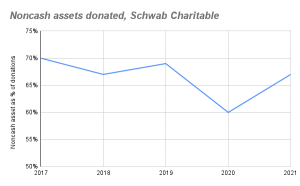The partial federal government shutdown became the longest in history over the weekend with hundreds of thousands of “non-essential” federal employees furloughed. Nonprofits have responded in various ways, including setting up food pantries for Transportation Security Administration (TSA) agents, who are working without pay.
The biggest impact is likely felt in the Washington, D.C. area. Other regions that have a large per-capita federal workforce or military, such as Alaska, also will feel effects of the shutdown, according to David Thompson, vice president of public policy at the National Council of Nonprofits in Washington, D.C. The U.S. Department of Interior has a big impact in areas with Indian tribes, like in Oklahoma. “It affects large parts of the West. With a lot of tribes, there’s a lot of human services — areas that most politicians in D.C. don’t pay attention to — that could have real harsh impacts,” Thompson said.
Charities large and small have diverted their attention to address needs of furloughed employees and others affected by the shutdown.
The Kiwanis Club of Elmhurst, outside Chicago, Ill., has pledged to cover lunch expenses for kids of any family feeling the pinch of the shutdown. The club started the Food for Thought program after the Great Recession 10 years ago when learning that children who didn’t have lunch money were going without lunch, according to Rich Rosenberg, a long time member of the club.
The club’s annual pancake breakfast raises $9,000 to $12,000 annually to cover the lunch project and other projects that help kids. The project costs $1,500 to $2,000 yearly.
Rosenberg said the school’s social workers help identify children who could benefit from the free lunch. “This in no way replaces federal support or food stamps,” he said. “We just serve kids whose mom or dad may be short for one reason or another.”
Some charities are aiming to help those of the canine and feline varieties affected by the shutdown. San Diego Humane Society (SDHS) will this week offer two bags of pet food to families of federal employees affected by the shutdown. PAWS San Diego, a program of SDHS, will have temporary distribution centers set up at three campuses, in Escondido, Oceanside and San Diego. Pet food will be available on a first-come, first-served basis while supplies last for each family who can show proof of federal employment.
In Ogden, Utah — home to thousands of Internal Revenue Service (IRS) and U.S. Forest Service workers — Catholic Community Services of Northern Utah waived income requirements to access its food pantry so that federal workers could use it twice a month during the shutdown. In Huntington, W.V., employees of the Ashland Federal Corrections Institution have turned to a local food bank for help while Coast Guard employees in Key West, Fla., have accessed charitable food for the first time, according to Hunger Free America, a national organization based in New York City.
While charities respond to needs of federal employees who are furloughed, the organizations also could eventually be squeezed financially by the shutdown. Domestic violence shelters receive grants via the Violence Against Women Act (VAWA) and the Victims of Crime Act Fund, both administered by the U.S. Department of Justice (DOJ).
The U.S. Department of Agriculture, which administers the Supplemental Nutrition Assistance Program (SNAP), is still issuing checks but funding could be exhausted within the next several weeks. Payment of rental housing assistance and other programs continue to operate but the U.S. Department of Housing and Urban Development (HUD) informed landlords that its ability to continue payment depends on how much budget authority the agency has, raising the potential that housing assistance could run out. HUD could be unable to renew contracts with local entities that provide housing if the shutdown continues.
Food is the area of greatest concern because SNAP funding could eventually dry up. The Department of Agriculture has told states they can carry funding through February, Thompson said. “Will it [the shutdown] last until March? I can’t imagine that it would but I’m surprised by the current status; there is no rulebook anymore,” he said.
State associations have dealt with state government shutdowns in recent years, including New Jersey, Pennsylvania, California and Minnesota, Thompson said.
The state association in California, CalNonprofits, put out a three-question survey last week asking about the impact of the shutdown on organizations and communities and what steps nonprofits have taken, or will take, to manage such impact.
Some nonprofits are hearing that grants won’t be issued until the shutdown is over, Thompson said, and contractors, whether they are nonprofit or for-profit, are not expected to be paid until after the shutdown, if at all. Furloughed employees are likely to be reimbursed after a shutdown but “that doesn’t help you when your mortgage is due,” he said.
The National Parks Foundation is stepping in to clean up national parks but Thompson warned that could be detrimental in the long run. “Yes, you want clean parks. Cleanup is a public necessity,” he said, but the after-effects and loss of trust can be lasting. “When nonprofits step in to do what they do — solve problems — they end up paying staff but they’re treated as volunteers,” he said. In the past, some governments have not paid for those services and get used to volunteers doing the work. “Nonprofits have to divert from their mission for government not doing its job; those are downstream effects. I’m guessing that nonprofits burned by governments in the past probably are less likely to step in,” Thompson said.
Hunger Free America announced a new “Fed Food” toll-free 800 line and web portal to help anyone affected to locate free food and/or to volunteer their time to fight hunger.
Any employee of the federal government or a federal contractor — or any family member of such an employee — who is struggling financially as a result of the government shutdown, can call the toll free number 855-859-4647 or go to www.HungerFreeAmerica.org/FedFood to find food resources near them, such as government food programs and private food pantries, and/or to be connected with anti-hunger volunteer activities so they can productively use their time off work.
The toll-free line will have live operators answering calls Monday through Friday from 9 a.m. to 5 p.m. (EST) and will take messages at other times. The hotline and web portal will be active as long as the shutdown lasts.
“We want to make sure that anyone harmed by the shutdown can get and/or give help,” Hunger Free America CEO Joel Berg said in a press release announcing the hotline. “Last Friday, hundreds of thousands of federal employees affected by the shutdown missed their first paycheck,” he said, adding that the lowest paid federal employees (GS 3 pay level) have starting salaries of about $23,000.
“Given that one in five Americans overall have either zero savings or have debt larger than their savings, it’s clear that low-income federal employees could quickly run out of food after being denied even one paycheck,” Berg said. “This shutdown vividly demonstrates just how many Americans are only one missed paycheck away from hunger,” he said.
United Way Worldwide on Friday announced that it will lead the formation of the United for U.S. coalition, a joint effort by corporate partners, organized labor, the United Way network and nonprofits to assist furloughed federal workers and others impacted by the ongoing government shutdown.
United Way and its community partners are preparing for an expected uptick in calls to 2-1-1 from those seeking assistance with rent and mortgage payments, utility bills and groceries.
United Way of Northwest Arkansas in Lowell, Ark., expected to close its 2-1-1 on Dec. 31, citing a decline in workplace giving, according to a recent report. The affiliate has since “decided to sustain the 2-1-1 hotline for the near term while it pursues more funding and analyzes the sustainability of the program,” according to a Jan. 18 statement. It would have been the only state in the nation without the 2-1-1 non-emergency service. The service anchors United Way’s community support by providing information about local social services, including the availability of public benefits and corporate assistance programs. The 2-1-1 network, 211.org, connects callers to resources and aid for monthly living expenses.
Wells Fargo will waive fees for customers who have direct deposit from the federal government, or at the customer’s request, will offer short- and long-term assistance for those who need extra time to make payments. Bank of America is offering personalized financial assistance through its Client Assistance Program.
Local United Ways also are providing services in areas with federal workers, including financial services and counseling, and where available, emergency housing and assistance funds for food, rent and other assistance, including:
- United Way of the National Capital Area in Washington D.C. established a $50,000 Emergency Assistance Fund to area nonprofits to meet people’s basic needs;
- United Way of Genesee County in Flint, Mich. launched a fund to help federal workers with emergency needs, specifically food, transportation and current utility payments;
- Mile High United Way in Denver, Colo. has a variety of resources for federal workers through 2-1-1 to connect people to health care services, food pantries, mental health resources, childcare, and utility and eviction prevention assistance;
- United Way for Southeastern Michigan in Detroit, Mich. is directing federal employees who call 2-1-1 to available resources, and coordinating food box distribution with local food pantries;
- United Way of Bay County in Bay City, Mich. established a Community Services Emergency Fund to provide cash payments to furloughed government workers for household bills, groceries and other basics; and,
- Seattle, Wash.-based United Way of King County is participating in local resource fairs for federal workers organized by the Port of Seattle.











